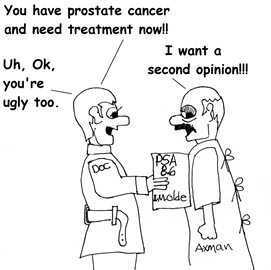I know, I know you’ve heard this a million times (well a lot anyway). “Always get a second opinion.” Is it necessary? If you get the same information the second time you may think it wasn’t necessary. But without more information how are you to know?
There are some benefits you might want to weigh…
- The first diagnosis may be wrong. It could happen. PSA tests are not 100 percent reliable, DRE exams are not always reliable either. Without more information you may be making a decision that you could regret later.

- A second opinion could suggest that, although you do have prostate cancer, no immediate treatment is necessary (watchful waiting).
- Another doctor or another clinic may suggest more or different alternative treatments. Surgery, radiation, hormones, freezing, pellets… Of course that means more decisions for you.
- And maybe a second exam and opinion would give you more peace of mind and support in making the very difficult decision about what you should do – and the decision IS yours.
How did you decide? What decisions are you contemplating now?
axman



 It is true that treatment (surgery, radiation, freezing, radioactive seeds) can lead to serious side effects. Most men who are diagnosed with prostate cancer do not die from prostate cancer. So is there any benefit in being diagnosed?
It is true that treatment (surgery, radiation, freezing, radioactive seeds) can lead to serious side effects. Most men who are diagnosed with prostate cancer do not die from prostate cancer. So is there any benefit in being diagnosed?